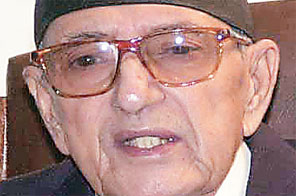Private sector loses its patron
KATHMANDU: Nepal lost the leader, who believed in democratic socialism, the role and capacity of private sector and the industrialisation of the country. Under late Girija Prasad Koirala’s leadership during the early 90s, the country took major policy decisions that brought sweeping changes in the economy.
“The economy is surviving even today due to decisions that were taken under his leadership post-1990,” according to former finance minister Dr Ram Sharan Mahat, who worked under him at different times and in different capacity.
Post-1990, the country not only saw multiparty democracy, the national economy also saw liberalisation. His government encouraged the private sector and the economy began to take off. Nepal implemented extensive reforms under his leadership to facilitate its integration with the global economy. Though the favourable initial effect of liberalisation on economic growth could not be sustained and inequality in distribution of income has continued to rise, the country saw many industries flourish post-1990.
Federation of Nepalese Chambers of Commerce and Industry (FNCCI) president Kush Kumar Joshi said that foreign investment policy was brought by Koirala’s government. “He was instrumental in bringing a foreign investment policy,” he said. Joshi remembers Koirala as a leader who always lent his ear to the private sector. “He always reacted spontaniously when the private sector approached him for his help,” he said adding, “Koirala always fought for democracy. His post-1990 movement established democracy and brought about economic liberalisation.”
Binod Chaudhary, president of Confederation of Nepalese Industries, reminisced, “When late Koirala became the PM, I was FNCCI vice-president. He totally trusted us and relied on us as we worked closely with his government in transforming Nepal’s economy from controlled to liberal. Tremendous changes took place then which resulted in higher-ever growth, close to nine per cent, doubling of exports and revenue. History will see him as a leader who played a crucial role in opening up the economy by supporting the private sector and taking the economy to an unprecedented height.”
Industrialist Rajendra Khetan said, “The economic liberalisation policy brought by his government helped boost the private sector especially banking, insurance, airlines, telecom and the media. Nepal entered the modern economic era under his leadership.”
“Koirala ended the licence-Raj and liberalised the economy,” remembers Diwakar Golchha. “He brought various policy changes during his tenure as Prime Minister,” he said adding that Koirala played a key role in the Nepal-India Trade Treaty that opened the door for Indian investment in Nepal. “Koirala was serious about bringing about an economic revolution through industrialisation,” Golchha added.
Brought up in the industrial capital of Nepal — Biratnagar — Girija Prasad Koirala knew how the economy worked and was aware of the importance of industrialisation. “He had strong faith in the capacity of the private sector and under his leadership post-1990 Nepal saw sweeping changes in its economy,” recalled Mahat.
It is no surprise then that a man, who started his political career from Biratnagar Jute Factory as a trade union leader in 1947-48, always stood for a market-oriented economy and social justice.
“To him, socialism meant roads where there were no roads, drinking water where there was no drinking water and employment where there was no employment,” he said adding that Koirala gave subordinates a free hand in implementing liberal economic policies.
Though various political parties came to power, the successive governments after Koirala’s government followed his policy of economic liberalisation. They all understood that Nepal should find a way of translating its integration with the global economy into higher growth and sustainable development by carrying out complementary policies to enhance supply elasticities and offset some of the adverse outcomes by cooperative action in partnership with its South Asian neighbours.






